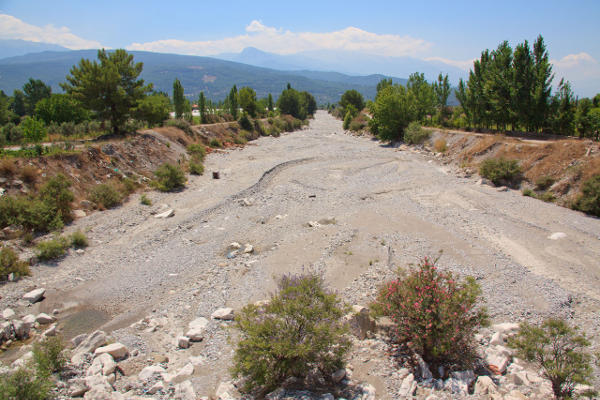A Pepper Grinder Post
Rivers Run Dry
Suppose you were to hear a news story about a place where the rivers and lakes had dried up. What would you expect to hear next? I would expect to hear how climate change caused by man had created the dire problem faced by the people in that area.
For this reason, it aroused my interest when I read the following prophecy in the Old Testament book of Nahum.
Yahweh is slow to get angry and has great power. He will certainly not acquit the guilty. His path lies in the wind and the storm, and the clouds are the dust of his feet. He rebukes the sea and dries it up, and he makes all the rivers run dry. Bashan and Carmel dry up, and the flowers of Lebanon wither. The mountains shake before him, the hills melt away, and the ground convulses in front of him--the world and everyone who lives in it. (Nahum 1:3-5, my translation)
A little background first. Nahum's prophecies were mainly directed against the people of Assyria, and specifically against the capital city of Nineveh. If Nineveh sounds familiar to you, it's probably because the prophet Jonah was sent to preach there. Jonah refused to go, because he wanted God to destroy the hated Assyrians, not have mercy on them. After some persuasion with a storm and a whale, Jonah did preach in Nineveh, the people did repent, and God did have mercy upon them. Now, some 50 to 100 years later, the situation had changed. It appears that the Ninevites went back to their usual wicked ways after God spared them. Now God planned another visit, this time to bring his just judgment on the city of Nineveh and the nation of Assyria.
 This brings me to the question of how people of that time saw natural disasters, as opposed to how we tend to see them now. What did people in the time of Nahum think when some unusual natural phenomenon took place? They knew that God was doing something. Even if the people did not believe in the one true God, they would still attribute any unusual thing happening to some sort of supernatural cause. It's easy for us from our proud position as the keepers of scientific knowledge to scoff at the superstitions of these people. "They didn't understand what really causes these things, so they made up stories about gods, goddesses, and gremlins to explain them," we say with a superior snicker.
This brings me to the question of how people of that time saw natural disasters, as opposed to how we tend to see them now. What did people in the time of Nahum think when some unusual natural phenomenon took place? They knew that God was doing something. Even if the people did not believe in the one true God, they would still attribute any unusual thing happening to some sort of supernatural cause. It's easy for us from our proud position as the keepers of scientific knowledge to scoff at the superstitions of these people. "They didn't understand what really causes these things, so they made up stories about gods, goddesses, and gremlins to explain them," we say with a superior snicker.
Now, I will not deny that we have learned things about how the physical world works that ancient people could not have dreamed of. However, I also wonder if we have lost some understanding that they had. We are very good at seeing physical causes of things, but is it possible that we are as guilty of seeing only natural causes of events as the ancients were of seeing only supernatural ones?
It makes me think of Eustace Scrubb in The Voyage of the Dawn Treader by C.S. Lewis. Eustace had been raised by very rational, progressive parents. When he finds himself in Narnia, he has many experiences that challenge his beliefs. In one scene, he meets someone who tells the boy that he is a star. Meaning an actual star, like the ones in the sky, except that this star is taking a break from his celestial duties while his star powers are being built up again. When the man tells Eustace that he is a star, Eustace replies that in his world, stars are balls of flaming gas. The star replies that in Eustace's world, that is not what stars are, but rather what they are made of. In a similar way, I think we are so focused on physical causes that we don't see any spiritual cause at all. What I believe is that events have both physical and spiritual causes.
When a lush area like Bashan, Carmel, or Lebanon experiences a severe drought, it may very well be that we can trace the drought to specific meteorological conditions like changing wind or ocean currents. Maybe we can even go further and speculate about things that may have caused those changing currents. However, our current tendency seems to be to trace all unusual weather to the activities of man. I think that's because we know that we can no longer attribute events to spiritual causes without seeming ignorant. We still want an ultimate reason for why something bad happens, and since we have created a world which centers around us, we become the natural primary cause.
I feel that our fear of seeming like an ignorant person of old has taken something crucial away from us. We can see the immediate causes of events, but we can't see the ultimate, spiritual causes. Since we can't admit that God might be behind natural events, we can never see these disasters as a call to repent and turn back to God. God may be shouting at us, but we are deaf, hearing nothing but the droning mantra of a world controlled by chance and impersonal laws, and centered around man.
- Pepper
Posted 2018-07-20
*Image Credits: Dry riverbed from www.publicdomainpictures.net.
